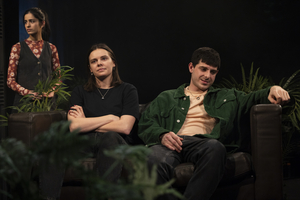Review: I KNOW I KNOW I KNOW, Southwark Playhouse
A contemporary play examines relationship issues in a post-#MeToo world

 DONOTALIGHT's debut production, held over from the Vault Festival, opens with a cross-talking, Caryl Churchill vibe and it takes a while for the ear to attune to Alice, who is talking into a phone recording her speech and Max and Hannah, who are in a car (except they are not, they're walking around a stage). Occasionally, the parties talk over themselves, a foreshadowing of their interlocking stories. Your reviewer was initially also thrown by misapprehending Alice's purpose as medically therapeutic rather than journalistic, as it turns out.
DONOTALIGHT's debut production, held over from the Vault Festival, opens with a cross-talking, Caryl Churchill vibe and it takes a while for the ear to attune to Alice, who is talking into a phone recording her speech and Max and Hannah, who are in a car (except they are not, they're walking around a stage). Occasionally, the parties talk over themselves, a foreshadowing of their interlocking stories. Your reviewer was initially also thrown by misapprehending Alice's purpose as medically therapeutic rather than journalistic, as it turns out.
That said, writer, Flora Wilson Brown, and director, Harry Tennison, intend to knock us off balance, disorient us, present a world that is not always what it seems. We learn slowly that the man who is the subject of Alice's account is Max and that Hannah will soon discover much that is disturbing about her longstanding musician-friend.
If Elvis Presley was the first rock star, he was also the first rock star to conduct a relationship with a very young fan, his 'courtship' of his later wife, Priscilla Beaulieu in the late 1950s. Then came the era of the 60s and 70s 'groupie', endlessly mythologised in films and books. It is perhaps a surprise that the seismic shift in perception of relationships resting on the imbalances between 'successful' men and much younger women instigated by #MeToo has taken until 2022 to reach the London stage, but this play puts it front and centre.
Hannah Khalique-Brown gives both a strength and vulnerability to Alice - the strength to articulate her story and the vulnerability to make an infatuation credible. Alice is bright, self-assured and ordinary enough to underline the point that her story could be any teenager's story.
Ethan Moorhouse's Max exudes the oily charm and strutting entitlement that his rock star persona has granted and that he has ruthlessly exploited to gaslight Alice, stringing her along (to use an old phrase) and blurring the line between abusive not-quite-boyfriend and shitty bloke. One of the play's strengths is its slow building of the case against Max without ever resorting to limiting Alice solely to the status of a victim.
The play's structural problem comes with Martha Watson Allpress's Hannah, who never really fits as Max's friend. We learn a little of her backstory (they're in her car on the way to her ex-girlfriend's wedding), but that plotline soon gets dropped and she becomes something of a vehicle for exposition, much of which we can surmise from Alice's account. She's also there to demonstrate that Max could shield his pursuit of very young fans even from old friends, but, again, we knew that, else he wouldn't be where he is now.
This is an important play that is acted well, but would come over stronger on a festival stage rather than in Southwark Playhouse's larger space. Such intimacy would gloss over the issues with Hannah's character development and focus the play more on Alice and Max. It might also ameliorate the tendency for the text to over-direct our sympathies and our censoriousness, which can be trusted to emerge from the narrative rather than come through more didactically.
It will be interesting to see where DONOTALIGHT go next, as this is a very contemporary play with hot button topics like social media grooming, post-#MeToo reckonings and the changing ideas around coercion all rolled into the mix. It shouldn't be the case that such matters are new to the stage, but that is so - these are voices that need to be heard.
I Know I Know I Know is at Southwark Playhouse until 16 April
Photo Ellie Kurttz
Reader Reviews
Videos

